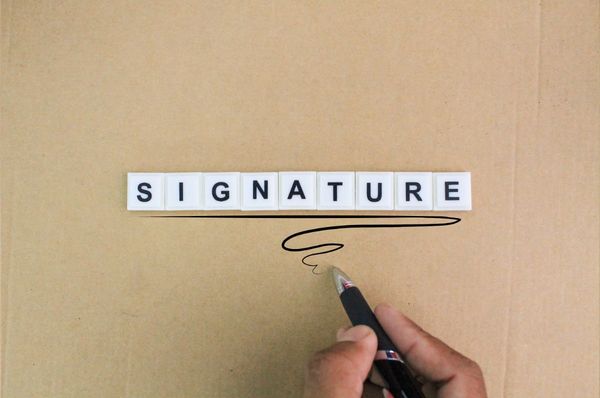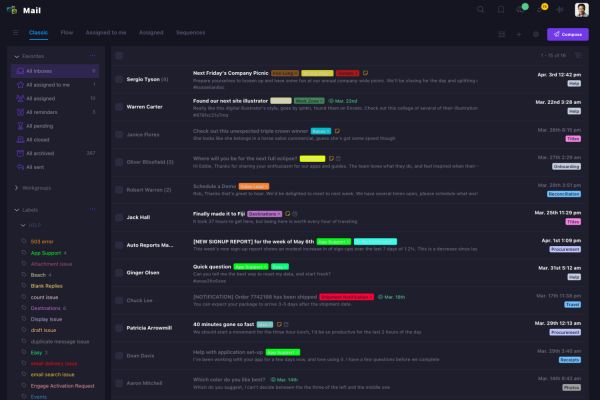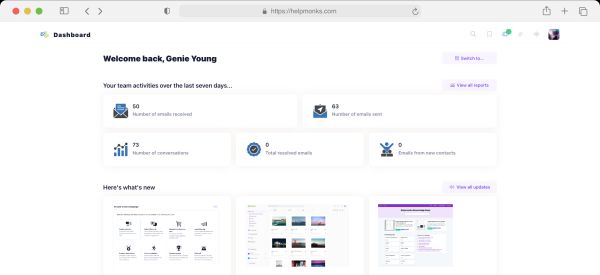
Introducing new pricing for Helpmonks
Discover Helpmonks' new pricing structure, featuring a flexible PRO plan, a FREE plan for smaller teams, and an exciting affiliate program. Experience unparalleled email management solutions today!
Read nowIn the realm of small business operations, 62% of customers expect your business to anticipate their needs. If that stat is anything to go by, excellent customer service is imperative to your success. But how can you meet, let alone exceed, customer expectations as a small business?
With fewer resources and leaner teams, you need more creativity with customer service compared to larger corporations. That's why we have created this guide for you. Read on for effective tips for small business customer service that will put your business on the map!
When you launch a small business, customer service is crucial in determining how successful you will be. But what does it entail?
Excellent customer service includes more than just answering customers' questions or solving problems. It's about creating an experience that leaves a lasting impression on your customers.
To create a good customer experience, you start by valuing your customers' time, maintaining a pleasant attitude, and providing knowledgeable and resourceful solutions.
For example, suppose a customer calls your support line with a technical issue.
To provide a great customer service experience, you would need to efficiently resolve the issue. You could also offer additional tips on avoiding similar problems in the future. This proactive approach solves the immediate problem, educates the customer, and makes them feel valued and cared for.
Excellent customer service is a holistic approach that involves various best practices and a commitment to exceeding customer expectations.
Customer service is critical for any business. Small business customer service is even more important, as you want to build a positive brand reputation and client base.
Let's explore some benefits of good customer service for small businesses:
Small business customer service is essential as it helps attract and retain customers.
Customers are four times more likely to switch to a competitor if their issue is service-related. 83% of customers agree that a good customer experience can turn them into a loyal customer.
So, in a landscape where acquiring a new customer can be costly, retaining existing ones becomes crucial.
And here's the kicker - loyal customers will likely buy from you more frequently than new customers. So, customer loyalty is a cornerstone for sustainable business growth.
Do you want your customers to spread the good word about your business? Start by perfecting your small business customer service!
How you treat your customers will determine if you retain them and, even better, if you can transform them into brand ambassadors.
You can save money on acquiring new customers and cultivate a loyal customer following when you provide good service. Then, the loyal customers will refer new customers, serve as case studies, and provide testimonials and reviews.
When your customers have a positive experience, they are more likely to share it with others, effectively becoming an extension of your marketing efforts - but at a fraction of the cost!
To grow your business, you need to attract new customers constantly. But in today's digital age, customers are not only smarter but also more vocal about their experiences.
Research shows that 79% of customers are more informed now than in the past. And a whopping 88% of respondents believe that customer expectations are higher than ever.
Providing excellent customer service will result in positive online reviews and high ratings on review platforms. Potential customers frequently check reviews before making a purchase decision. If they see a bunch of great reviews, they are far more likely to go ahead with the purchase.
With excellent small business customer service, you can rely on your customers to be your brand advocates. In an era where word-of-mouth can spread like wildfire, especially through social media, a single positive customer experience can attract many new customers.
Consistently good customer service also builds a positive reputation for your brand. A strong reputation will attract customers looking for reliable and trustworthy businesses.
The role of customer service in driving small business growth cannot be overstated. It creates direct communication with your customers, leading to invaluable insights that can fuel innovation and refine your business strategies.
Your customers expect a high level of service. Exceeding these expectations can set you apart from competitors and position your business for exponential growth.
Excellent customer engagement can help you tap into new customer segments, refine your product offerings, and pivot your business model. All these contribute to business growth!

Now that we've explored the why, let's dive into the how. Mastering good customer service practices is no small feat, especially when you have fewer resources.
The following eight tips will help you deliver a customer experience that keeps your customers satisfied for long-term success.
Empathy is a fundamental element of small business customer service that can make or break your relationship with your clientele.
While there is so much technology to help businesses deliver good service, nearly half of customers still feel businesses don't show them enough empathy. These customers feel that companies are overly- reliant on digital technologies and offer "human-less" customer service experiences.
So, how can your small business show empathy?
First, listen to your customers. Understand their needs, frustrations, and what they value in a product or service. By doing so, you can offer solutions that are not just quick fixes but also long-term resolutions. You'll show that you've taken the time to understand their unique challenges!
For example, let's say a customer contacts you because their package arrived damaged.
Instead of just offering a refund or replacement, empathize with their disappointment. Acknowledge the inconvenience they've experienced and assure them you're taking steps to prevent the same from happening again.
Here's an example of an empathetic reply to the customer complaint:
"I'm sorry to hear that your product arrived damaged. I can imagine how inconvenient this must be for you.
We take full responsibility for this, and we would like to rectify the situation. Would you prefer a replacement or a refund?"
Your customers want to feel valued and appreciated. Establishing personal connections in small business customer service is crucial for building trust and loyalty.
From the get-go, address your customer by name to make the conversation more personal.
To build a connection, you must understand your customers' needs and expectations. This involves active listening and asking the right questions to understand what the customer wants.
Once you understand your customer's needs, you can tailor your service to meet those requirements. In turn, you'll make the customer feel like they are the only person who matters now. Be genuine in your interactions, avoiding generic or robotic responses. Use a polite and helpful tone.
Say a customer calls to inquire about a product they've seen online. You don't want to just provide the answers and be done. Instead, you can open the door for more communication to also get a chance to recommend other products in your lineup.
Here's an example of what you can say: "That's great to hear! Have you tried the [product] before, or is this a new venture for you?"
After the initial interaction, send a follow-up message asking about their experience with the product or service. This will show the customer that you remember and value them.
71% of customers expect your business to provide personalized experiences, and a staggering 76% feel frustrated when you don't meet this expectation.
This personalization means leveraging customer data to understand your audience better. It allows you to offer solutions that are not just generic fixes but are tailored to individual problems.
You need to collect and analyze your customer data to offer customized responses. This could be as simple as tracking their purchase history or as complex as using AI to analyze customer interactions across various touchpoints. Use this data to understand their preferences, needs, and even their pain points.
Suppose a customer contacts you with a complaint about a delayed shipment. A generic response might be, "We apologize for the delay. Your order will arrive soon."
A better way to apologize would be: "We're sorry for the delay in shipping your order of [specific product]. To make up for the inconvenience caused, we would like to offer you a 10% discount on your next order. Just use the code [promo code] when checking out."
Customized responses require you to:
Use the customer's name and refer to their specific issue or query.
Offer multiple solutions and let the customer choose what suits them best.
After resolving the issue, send a personalized follow-up email asking if they're satisfied with the solution provided. This not only shows that you care but also allows you to rectify any lingering issues.

Customers can sense when someone is unhappy or doesn't want to be helping them. A positive attitude can make customers feel more welcome and appreciated, leading to a more satisfactory resolution for both parties.
To be positive, be upbeat in your language. Use affirming words like "certainly", "absolutely", and "of course" to convey an optimistic attitude.
It's also crucial to acknowledge the customer's issue and apologize sincerely. This shows that you take their concerns seriously and are committed to resolving them.
Lastly, always offer a solution or ask if there's anything more you can do for the customer. This leaves them feeling cared for and valued, which is the ultimate goal of excellent customer service.
When we say customers have higher expectations regarding customer service, it includes how long you take to respond when they reach out. Slow or delayed responses can lead to customer dissatisfaction and, ultimately, loss of business.
To succeed with this, you want to set clear expectations for response times. Whether it's an automated message or a human response, let the customer know when they can expect to hear back.
You can use canned responses for common queries to speed up the process, but make sure they are personalized to avoid sounding robotic. The best thing about canned responses is that they maintain speed and consistency - both vital for your customer service and brand reputation.
If a full resolution will take time, regularly update your customer on the progress. Doing so reassures them that their issue is a priority.
Suppose a customer reaches out with a technical problem. You can reply with:
"Thank you for contacting us about your technical issue. We're looking into it and will resolve it within 24 - 48 hours. We'll keep you updated on our progress."
Such a response builds trust with the customer while guaranteeing that you will offer a solution to their problem within a specific time frame.
When you want to offer good small business customer service, your most powerful resource is understanding your products and services. This instills confidence in your customers and enables you to provide quick and effective solutions.
Train your customer service team about your offers. Update the training for every new feature, product, or service you add.
With this knowledge, you'll help those indecisive customers and guide them to the best choice for their needs. Also, when you understand what your business offers, you can provide unconventional tips and hacks for unique customer problems.
Imagine a customer who wants to buy a laptop from you but is unsure which model to get.
When your customer service team understands your products, they can recommend a laptop that fits the customers' needs. Here's an example of a response they could give:
"Based on what you're looking for, I'd recommend our XYZ model. It has a fast processor for multitasking, ample storage for your files, and a long-lasting battery. Plus, since you're into graphic design, the high-resolution screen will be a big advantage."
Rewarding customer loyalty is not reserved for big corporations. Even small startups should consider it. Today, around 90% of businesses benefit from loyalty programs.
Loyal customers drive your business. They are the ones who return, spend more, and become ambassadors for your brand.
To create a loyalty program for your business, start by defining your objectives. These could be anything from boosting sales to increasing customer engagement.
Then, choose a structure like a points-based system where customers earn points for purchases or actions like social media engagement. You could use a customer engagement platform to manage the program and decide on appealing rewards like discounts or exclusive offers.
As a small business, you can offer early access or exclusive deals to new products or services. Then, when rewarding customers, study the customer preferences to offer rewards that are meaningful to them. This will increase the chances of them taking you up on the offer.
Sending regular follow-up messages is a cornerstone of exceptional small business customer service. This strategy will help you build long-lasting relationships and promote customer retention.
Following up shows you care about the customer's experience and want to hear their feedback. It can lead to repeat purchases, help recover lost sales, and provide deep insights into customer preferences.
Imagine a customer just purchased a new software package from your small business. A good follow-up message could be:
"Hi [customer's name], we noticed you recently purchased our [software package]. How has your experience been so far? Do you have any questions or need further assistance? We're here to help!"
This follow-up actively engages your customers and opens the door for future interactions that will boost your small business customer service.
Here are some communication tips to follow when following up with customers:
Use positive language. Avoid words with negative connotations, like "can't" or "won't." Instead, focus on how to solve the problem or meet the customer's needs.
Incorporate questions into your follow-up messages to engage the customer in a dialogue. This helps you gather more information and makes the customer feel heard and valued.
Here are instances where a follow-up will boost your small business customer service:
After a customer makes a purchase: This is a good way to gain feedback about your product or service. You can also offer more knowledge to help the customer maximize your offer.
Post-service completion: Send a follow-up to confirm the completion of a service. This will make your business appear more professional.
Mastering customer service is a strategic advantage for small businesses. From showing empathy to rewarding loyalty, each tip above is a stepping stone to meeting and exceeding customer expectations. Remember, excellent customer service doesn't just happen; it's crafted carefully, one interaction at a time.
If you're looking to integrate these tips into your small business customer service strategy, try Helpmonks! We offer a robust email management solution that streamlines your customer service interactions.
With Helpmonks, you can easily implement all the best practices above right from your email dashboard.
Sign up and improve your customer service today!

Discover Helpmonks' new pricing structure, featuring a flexible PRO plan, a FREE plan for smaller teams, and an exciting affiliate program. Experience unparalleled email management solutions today!
Read now
Dynamic email signatures increase brand visibility, build brand identity, and boost conversions. Learn how to create and update dynamic email signatures.
Read now
Looking for an email marketing automation software? This guide shows what to look for. We'll also review the best tools for your online marketing needs.
Read now
Using customer engagement solutions helps you keep your existing customer base and grow. Here are the top 10 customer engagement solutions for your business.
Read now
Empower your team and delight your customers.
